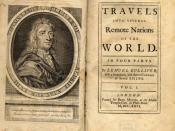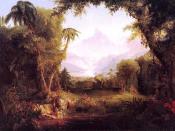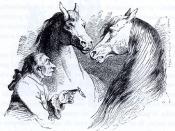This paper deals with the depiction of my conception of SwiftÃÂs idealism in the 4th part of the Gulliver's Travels (A Voyage to the Country of the Houyhnhnms) concerning GulliverÃÂs confrontation with the social and political structure of the Houhnhnms and subsequently his expulsion. This portrayal is then dismantled, analyzed and a certain number of interpretations is achieved to show whether there is a concealed satire by chance due to the fact that this is a SwiftÃÂs text after all.
Let me start with a statement that briefly exemplifies the term idealism: A principle that typifies things in an ideal stature or as they ought to be rather than as they really are.
At the beginning I would like to illuminate what exactly has Gulliver idealised.
By showing features which seem to distinguish him from the brutish Yahoos the stranded protagonist enjoys the hospitality of the native beings and at the same time he is gradually, as he gets more and more acclimatized, reaching the conclusion that this must be the place where his dreams of a perfect society have come true.
He admires these creatures for they are gifted with "a general disposition to all virtues, and have no conceptions or ideas of what is evil."1, they do not have word in their language to express lying, they consider nature and reason as sufficient guides for a reasonable being and apart from that the narrator also observes that he has never been infected with sickness throughout his stay. All these facts contribute to the conclusion that Gulliver has found the ideal society which complies with requirements based on his momentary state of mind.
According to the properties and structure of the Houhnhnms society the protagonist has actually idealized a kind of a totalitarian, brainwashed regime based on privileged sections.


